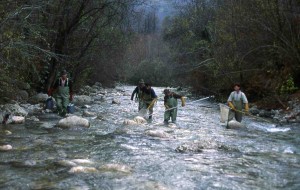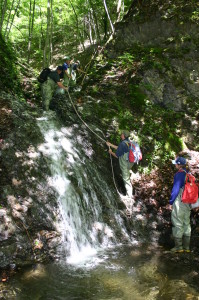When there is no volume/pages, it means it is in press ("in press" apparently still not supported by Mendeley)
Bateson, P., and K. N. Laland. 2013. Tinbergen’s four questions: an appreciation and an update. Trends in Ecology & Evolution.
Benyshek, D. C. 2013. The “early life” origins of obesity-related health disorders: New discoveries regarding the intergenerational transmission of developmentally programmed traits in the global cardiometabolic health crisis. American Journal of Physical Anthropology.
Berg, O. K., G. Bremset, M. Puffer, and K. Hanssen. 2013. Selective segregation in intraspecific competition between juvenile Atlantic salmon ( Salmo salar ) and brown trout (Salmo trutta). Ecology of Freshwater Fish.
Christiansen, F., G. a. Víkingsson, M. H. Rasmussen, and D. Lusseau. 2013. Female body condition affects foetal growth in a capital breeding mysticete. Functional Ecology.
Correia, D. 2013. F**k Jared Diamond. Capitalism Nature Socialism.
Ellegren, H. 2013. Genome sequencing and population genomics in non-model organisms. Trends in Ecology & Evolution.
Emery Thompson, M. 2013. Comparative Reproductive Energetics of Human and Nonhuman Primates. Annual Review of Anthropology 42:287–304.
French, W. E., B. Vondracek, L. C. Ferrington, J. C. Finlay, and D. J. Dieterman. 2013. Winter feeding, growth and condition of brown trout Salmo trutta in a groundwater-dominated stream. Journal of Freshwater Ecology 1–14.
Goto, A., H. Arioka, and R. Yokoyama. 2013. Plastic life-history variation along the course of a steep mountainous river in male Cottus hangiongensis (Pisces: Cottidae). Environmental Biology of Fishes.
Lanfear, R., H. Kokko, and A. Eyre-Walker. 2013. Population size and the rate of evolution. Trends in Ecology & Evolution.
Marcil-Ferland, D., M. Festa-Bianchet, A. M. Martin, and F. Pelletier. 2013. Despite Catch-Up, Prolonged Growth Has Detrimental Fitness Consequences in a Long-Lived Vertebrate. The American Naturalist .
Marks, J. 2013. The Nature/Culture of Genetic Facts*. Annual Review of Anthropology 42:247–267.
Moorad, J. A. 2013. Individual fitness and phenotypic selection in age-structured populations with constant growth rates List. Ecology.
Nelson, R. M., M. E. Pettersson, and O. Carlborg. 2013. A century after Fisher: time for a new paradigm in quantitative genetics. Trends in Genetics.
Robinson, O. J., N. H. Fefferman, and J. L. Lockwood. 2013. How to effectively manage invasive predators to protect their native prey. Biological Conservation 165:146–153.
Skolnick, A. M. H., A. Moroni, E. Siri, and L. Soliani. 1973. A Reconstruction of Historical Persons from the Parish Registers of Parma Valley , Italy. Genus 29:103–155. (related to a project I am working on and I will describe at some point)
Stier, A., V. a. Viblanc, S. Massemin-Challet, Y. Handrich, S. Zahn, E. R. Rojas, C. Saraux, et al. 2013. Starting with a handicap: phenotypic differences between early- and late-born king penguin chicks and their survival correlates. Functional Ecology.


